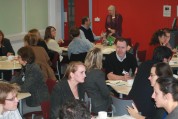
Lead Institution: Bournemouth University
Collaborating with: STEMNET, University of Bath, University of the West of England
This seminar, held at the University of the West of England in November 2011, saw over 30 delegates gathering to discuss the role of Peer Assisted Learning (PAL) in STEM programmes. Sessions covered the full gamut of issues such as: training PAL leaders, on-line PAL and postgraduate researchers providing mentoring for first year maths students. There was also a presentation on helping students be proactive in managing their transitions to university.

Delegates at work
Dr Diane Nutt (Acting Assistant Director Learning and Teaching at Teesside University) got the seminar off to an excellent start by providing an overview of First Year Experience not just from a UK, or European perspective, but from an international one, including ideas from South Africa.
An event flyer and associated presentations can be downloaded below to give you a flavour of the day:
Prioritising first year experiences, Diane Nutt
PAL leader training at Bournemouth University, Stephen Parton & Vicki Noade
Maths support for first year Engineering students, Ria Symonds
Developmental transition, Chris Keenan
Following the seminar, a briefing paper was produced which: summarised findings from project work thus far; highlighted other relevant projects across the sector and captured core learning from the second seminar. The briefing paper can be downloaded below:
Some key points from discussion from the seminar are below:

Chris Keenan & Dr Diane Nutt
What did you hope to gain from attending the seminar?
“I hoped to connect with learning developers from other institutions and find out what was going on for them, so it was perfect for me.”
“We’re doing an increasing amount with Engineering and Maths students and I wanted to see other institutional approaches that have worked and even new ideas or ideas in transition.”
“Learn more about research into first experiences of undergrads.”
If you were interested in finding out more about Peer Assisted Learning, what is your starting point?
“I’m interested in PAL but seems costly and too ambitious for us in the present situation.”
“PAL has always been at the back of my mind but I never knew, from a central department with limited funds, how I could make this happen on an institutional level. Given my closer relationship with schools, I’ll certainly be recommending this as an option and now I have some ideas and contacts in order to move it from the back of my mind into a real business case for why I can no longer afford not to do PAL.”
If you are interested in transition more generally, what do you already do to support students in this area?
“I can’t seem to find any institutional strategy for engaging first year students each school does their own thing so it feels like a patchy haphazard provision. I would love to a) Work closely with library and student services to develop a streamlined, consistent Open Workshop offer and b) Partner with one school , at least, to develop a pre-enrolment induction experience, that is fun and valuable for the students.”
“We contribute to several first year modules and run extended induction sessions looking at skills development for a number of courses. We have a page for new students www.brunel.ac.uk/headstart and run a face-to-face an online pre-induction week for under-represented learners (mostly mature students).”
What would you like to do in the future?
“Extend the website for all students to have more interactivity so students can meet tutors, make friends and ask their burning questions then, instead of cramming everything into induction week.”

Delegates at work
What sort of things did you learn on the day?
“I learned that people are doing it and that there are lots of good ideas for replication, as well as enthusiastic colleagues. It makes the fact that the UWL is coming from behind a lot easier to deal with because ‘fixing it’ needn’t be difficult.”
“PAL and the online version and several other good initiatives, including Stepping Stones. I only wish I could see it so I could steal it!”
“Excellent to hear about transition strategies from across the globe, eg South Africa.”
Was there a single thing that inspired you to find out more about?
“Diane’s and your enthusiasm for 1st year experience and evidence of beneficial outcomes that Universities value. That is they are measurable in addition to contributing to feel good factor for students.”
"South African strategies for first year undergrads."
Did you make contacts with others that will help you to develop further ideas and practices?
“Yes, I’m scoping out my target and will, no doubt, be in touch for mentoring soon!”
“Yes, I’ve emailed several people since and hope to get some more ideas to start to develop the online resources we have. Thanks for putting it on Chris.”
“Someone wanted to know more about maths cafes; I have put him in touch with the HE STEM sigma project manager.”
Christine Keenan
Project lead, Bournemouth University
Penny Mitchell
Project coordinator, Bournemouth University
Heather Campbell
STEMNET
Iryna Withington
University of Bath
Lisa Benjamin
University of Bath
Makis Malliris
University of the West of England